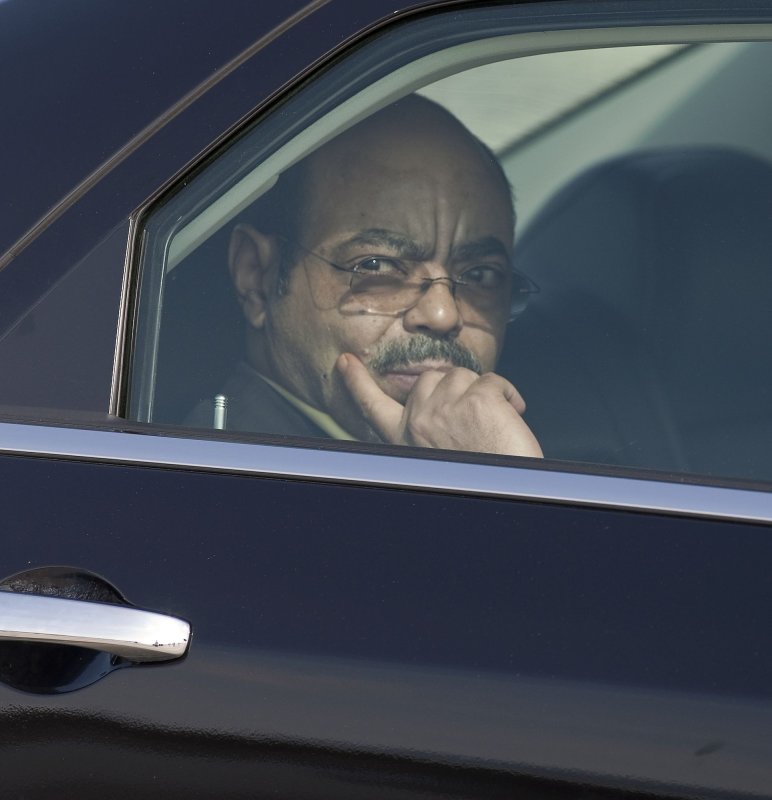The Prime Minister of Ethiopia Ato Meles Zenawi departs in a limousine after arriving at Toronto International Airport, June 24, 2010 to attend the G8, G20 Summits in Huntsville and Toronto, Ontario, Canada. UPI/Heinz Ruckemann. |
License Photo
CAIRO, Dec. 8 (UPI) -- The simmering dispute over the Nile River between Egypt and upstream African states is heating up with Addis Ababa alleging Cairo supports insurgents fighting the government of Ethiopian Prime Minister Meles Zenawi.
The expected breakup of Sudan, Egypt's southern neighbor and its ally in the Nile dispute, next January following a referendum on southern independence will further complicate an already complex quarrel over a dwindling resource.
Egypt and Sudan have been locked in more than a decade of dispute with Ethiopia, the source of the Blue Nile, and six other states through which the Nile passes over a more equitable sharing of the great river's water.
In 1929, when Egypt and Sudan were ruled as a single country by the British, they were awarded rights to 75 percent of the Nile's flow. The upstream states weren't allocated a share.
When Egypt became independent in 1959, that ruling was upheld, with added stipulation that all Nile Basin countries were required to secure Cairo's approval for any project that involved Nile water.
The Egyptians have allegedly refused to relinquish any of that to Ethiopia and the other upstream states: Uganda, Tanzania, Kenya, the Democratic Republic of Congo, Burundi and Rwanda.
These states, which claim the 1929 treaty is a vestige of colonialism, are demanding more water because of burgeoning populations and the pressing need for greater food production and hydroelectric power.
In May, the upstream states established the River Nile Basin Cooperative Framework, to work toward fairer water-sharing. It was ratified by Ethiopia, Uganda, Tanzania, Kenya and Rwanda. Burundi and the DRC haven't signed the agreement. The signatories gave the other Nile states a year to join the pact before putting it into action.
Egypt and Sudan were stunned and refused to sign, exacerbating tensions between them and the non-Arab African states. Egypt accused the upstream states of "misusing our Nile."
The referendum in southern Sudan is generally expected to result in the creation of a new state there.
Egypt is seeking to build relations with the southern Sudanese leaders. But on the Nile issue it's possible they could align with their African neighbors to the south rather than with Khartoum, against whom the south fought a civil war over three decades that ended in 2005.
That would strengthen the hands of Egypt's Nile rivals, who are determined to force Cairo and Khartoum to give up some of their share of the Nile's water.
Recent developments in the dispute have caused intense anger in Cairo and among the upstream countries, whose links among themselves are strong.
Zenawi has infuriated Egypt by building five huge dams on the Nile over the last decade and has started construction of a $1.4 billion hydroelectric facility.
In 1985, Boutros Boutros-Ghali, then Egypt's foreign minister, declared that the next Middle East war would be fought over "water, not politics."
That hasn't come about but Egypt relies for 90 percent of its water on the Nile, which has been its lifeline for millennia. As its population swells, and climate change intensifies, it will need ever larger quantities to survive.
Despite the fiery rhetoric, diplomacy has prevailed. But Zenawi declared Nov. 23 in Addis Ababa that Egypt couldn't win a war with Ethiopia over the Nile.
He accused Cairo of seeking to destabilize Ethiopia by supporting several groups of rebels opposed to his autocratic regime, a charge Cairo adamantly denies.
"If we address the issues around which the rebel groups are mobilized then we can neutralize them and therefore make it impossible for the Egyptians to fish in troubled waters because there won't be any," the Ethiopian leader said.
"Hopefully that should convince the Egyptians that, as direct conflict will not work and as the indirect approach is not as effective as it used to be, the only sane option will be civil dialogue …
"I'm not worried that the Egyptians will suddenly invade Ethiopia," Zenawi said.
"Nobody who has tried that has lived to tell the story. I don't think the Egyptians will be any different and I think they know that."
Egyptian Foreign Minister Ahmed Aboul Gheit declared, "We are not seeking war and there will not be war."















